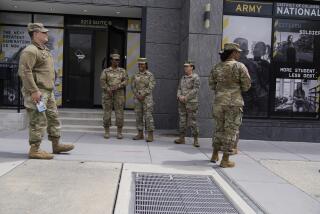Joint Chiefs Chairman Sees Need for More Base Closings
- Share via
WASHINGTON — The chairman of the Joint Chiefs of Staff said Thursday that cracks are beginning to appear in U.S. military readiness, and he declared that only by saving money through politically unpopular base closings will the military be able to buy what it needs.
In a farewell interview before his term ends next month, Gen. John M. Shalikashvili told reporters that members of Congress who have stymied the military-base shutdowns need to “put politics aside.”
“We don’t have the money we need for troops. . . . I don’t see how we’re going to get there from here without a big commitment to close more bases,” he said. “I don’t know how I can say it more bluntly.”
Shalikashvili’s comments signaled the administration’s determination to press forward with efforts to close bases, even though that drive has been bitterly opposed by lawmakers from California and elsewhere. Earlier this summer, lawmakers derailed the issue for at least the remainder of the year, despite the administration’s efforts to portray the move as essential to national security.
Shalikashvili’s comments also intensified the military’s public expressions of concern about readiness.
The general said too much equipment is out of commission in some military units because of a lack of spare parts. He also said too many units have fallen below adequate strength levels as manpower has been cut by roughly one-third.
But he said the greatest source of concern is the stressful pace of overseas deployments, exercises and other operations, which has many service members working too long and too far from home. This pace has the military leadership “concerned more than anything else,” Shalikashvili said.
Contrary to the arguments of some GOP leaders in Congress, he said this overwork is not a consequence of the Clinton administration’s willingness to dispatch troops overseas. At any one time, he said, the military has 40,000 of its 1.4 million troops in special deployments in such places as Bosnia, Macedonia and eastern Zaire--too few to support an argument that operations are “leaving us breathless.”
Instead, he argued that a major cause of the problem is too many military exercises. He said he has already ordered a 25% cut in joint-services exercises over the next two years and that he has urged the chiefs of each service to reduce their intramural exercises by the same amount.
Shalikashvili contended that the readiness problem is far less serious than it was after the Vietnam War in the late 1970s, when top Pentagon officials contended all was well even as unit commanders complained of a dangerous “hollowing” of the force.
While the military has shrunk by about one-third since the Cold War, “man for man, we are spending as much as we ever did for readiness,” he said.
Earlier this year, the Army disclosed that its recruitment levels were down several percentage points. In recent weeks, the Air Force has complained that overwork and the hiring of experienced pilots by commercial airlines have damaged its ability to hold on to some of its best fliers.
Analysts say these signs add up to a deepening problem, though most indicators continue to suggest that military readiness has not been significantly damaged by the eight-year drawdown. Aptitude tests of new recruits, for example, show that the military is still attracting capable young people.
And analysts note that the strain is not uniform across the services, but falls far more heavily in some parts than on others.
While the Army and the Air Force have sent up distress signals, the Navy and Marines apparently do not have the same stresses, despite their longer deployments, noted Michael O’Hanlon, an analyst at the Brookings Institution in Washington.
On another topic, Shalikashvili proposed that the government appoint a single official to oversee deployments abroad to ensure that U.S. military and civilian officials work together smoothly in peacekeeping and nation-building missions.
Citing the examples of the U.S. expeditions in Haiti, Bosnia and Somalia, Shalikashvili said missions have sometimes had trouble accomplishing complicated tasks because there was no single official to direct activities.
More to Read
Get the L.A. Times Politics newsletter
Deeply reported insights into legislation, politics and policy from Sacramento, Washington and beyond. In your inbox twice per week.
You may occasionally receive promotional content from the Los Angeles Times.











